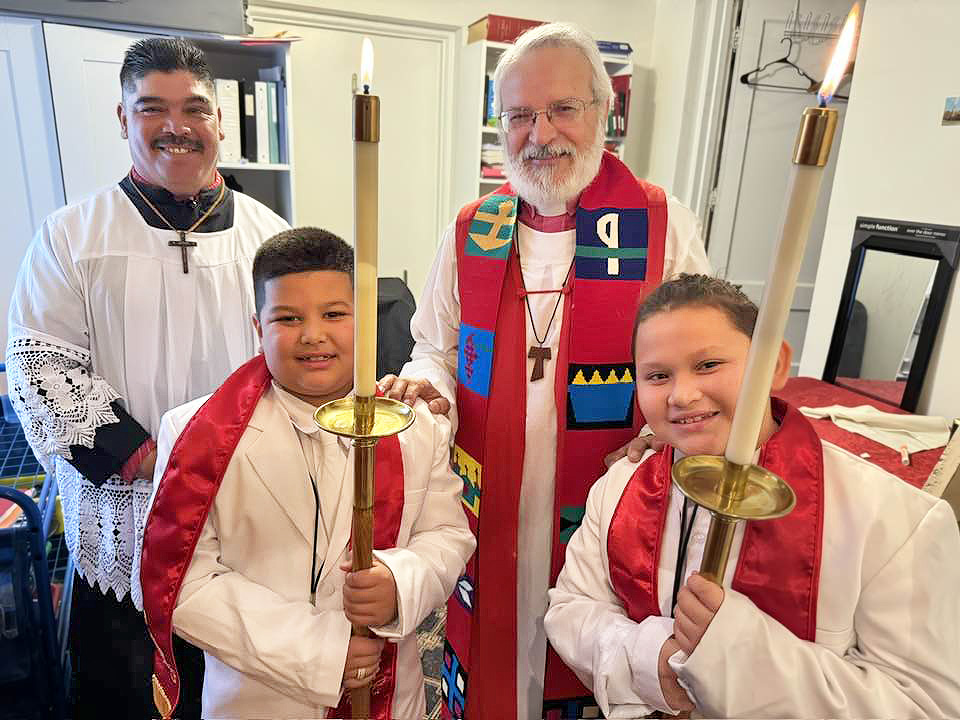
Bishop Naudel Alves Gomes, with acolytes and a lay minister, prepares for a Sunday service at St. Simon’s Church, San Fernando, where he is bishop-in-charge. Photo: John Taylor
Latino/Hispanic ministry in the Diocese of Los Angeles is “at a time of new beginnings,” says the Rt. Rev. Naudal Alves Gomes, former archbishop and primate of Brazil, who recently was named by Bishop John Harvey Taylor as bishop missioner for ministry in Spanish.
Gomes now convenes the working group of Latino and Latina clergy from congregations that carry out ministry in the Spanish language. As convener he succeeds the Rev. Antonio Gallardo, Ph.D., who became rector of St. Luke’s Church, Long Beach, last year.
“I would like to express my gratitude to Bishop John, who has called me into this new ministry,” Gomes told The Episcopal News in remarks written in Spanish and translated by the Rev. Norma Guerra. “His leadership and concern for the life and mission of the church encourages us all.” Gomes also thanked Gallardo for “gathering and encouraging us, so that in dialogue and sharing we could follow our ministerial call in the communities that we have been called to serve.”
Gomes plans to extend the clergy cohort’s relationships with other church leaders on the diocesan and wider church levels. “The first steps to take in order to accomplish the task that I have been given is to start a dialogue with our colleagues, partners in mission, so that together we may decide the best roads to follow in order to strengthen and develop our ministries.”
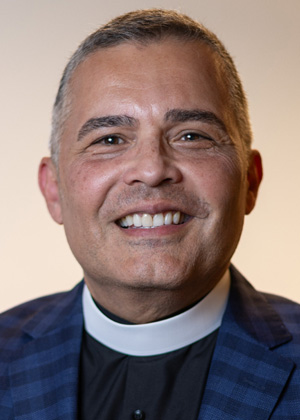
Antonio Gallardo, rector of St. Luke’s Church, Long Beach, formerly convened the Hispanic clergy cohort.
Gallardo, who discerned earlier this year that the time had come for him to cede his role as convener and make way for new leadership, is enthusiastic about his successor.
“I have had the privilege to meet Bishop Naudal personally and to share life in ministry,” he wrote to The News. “Last year, during a time of transition at St. Luke’s, he graciously accepted to be with us for a couple of months. During that time, I witnessed his humble spirit, his tender pastoral care gifts, and his desire to do nothing more than to serve God’s people.”
“It’s been such a blessing to work with Antonio as he has led our cohort of his fellow leaders of Spanish-speaking congregations,” said Bishop Taylor. “He’s lent pastoral power and keen strategic vision. His legacy of leadership will be in good hands indeed as Bishop Naudal takes the baton, with his hemispheric outlook and proven gifts of episcopal oversight, honed in a far-flung diocese in Brazil that covered even more territory than ours in Los Angeles. I’ve asked him to advocate strenuously for his colleagues, make sure they get the support they deserve, and think boldly about new missions.”
Gomes, who is bishop-in-charge at St. Simon’s Church, San Fernando, and St. Mark’s Church, Van Nuys, has connected with many of the diocese’s Spanish-speaking congregations and already has a firm grasp of what Latino/Hispanic ministry is and what it could be.
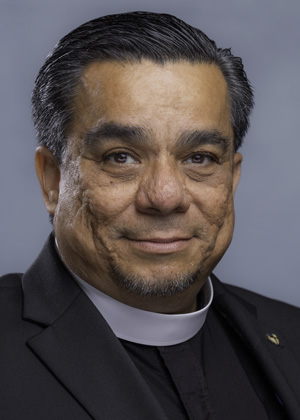
Carlos Ruvalcaba, chair of the Program Group on Hispanic Ministries, also serves at St. Stephen’s Church, Hollywood (Los Angeles).
“I had the opportunity to get to know many communities that are working with the Latino/Hispanic ministry,” he told The News. “It has been a time of great learning. I have seen communities with diverse ministries, well established and structured; others that were of great expression and prominence, but at the moment find themselves in a time of new beginnings. There is a diversity of experiences in mission, pastoral care and sacraments, and great challenges as well.”
Gomes and his cohort will work closely with the Program Group on Hispanic Ministries, which has existed since the 1940s, according to its current chair, the Rev. Carlos Ruvalcaba, assistant priest at St. Stephen’s Church, Hollywood (Los Angeles). PGHM plans and carries out programs for existing Latino Episcopalians as well as outreach projects for the Hispanic community.
The Spanish-speaking clergy group began to meet under the leadership of the late J. Jon Bruno, sixth bishop of the diocese, who saw a need for Latino/Hispanic clergy to support and encourage each other, Ruvalcaba said. The clergy group continues under the auspices of PGHM, and the two groups are distinct, but closely related.
“In 2024, the PGHM continues to be the gathering place for members of the 25 congregations with ministries that serve Spanish-speaking people,” Ruvalcaba said. “The mission of this diocesan group is to create, organize, and provide programs for formation, fellowship, and worship to our Latino/Hispanic community while at the same time promoting unity among ourselves and the other ethnic groups present in the Diocese of Los Angeles.”
While PGHM has clergy and lay members, the group to be led by Gomes is “exclusively for clergy serving Latino/Hispanic congregations,” Ruvalcaba explained. “Its purpose is to provide a space where clergy can come together to talk about the unique complexities, situations, and problems of ordained ministry while also finding collegial support and collaboration. At the same time, the group receives direct information from the PGHM about current programs, projects, and events so the clergy can bring the announcements of those opportunities directly to their own settings.”
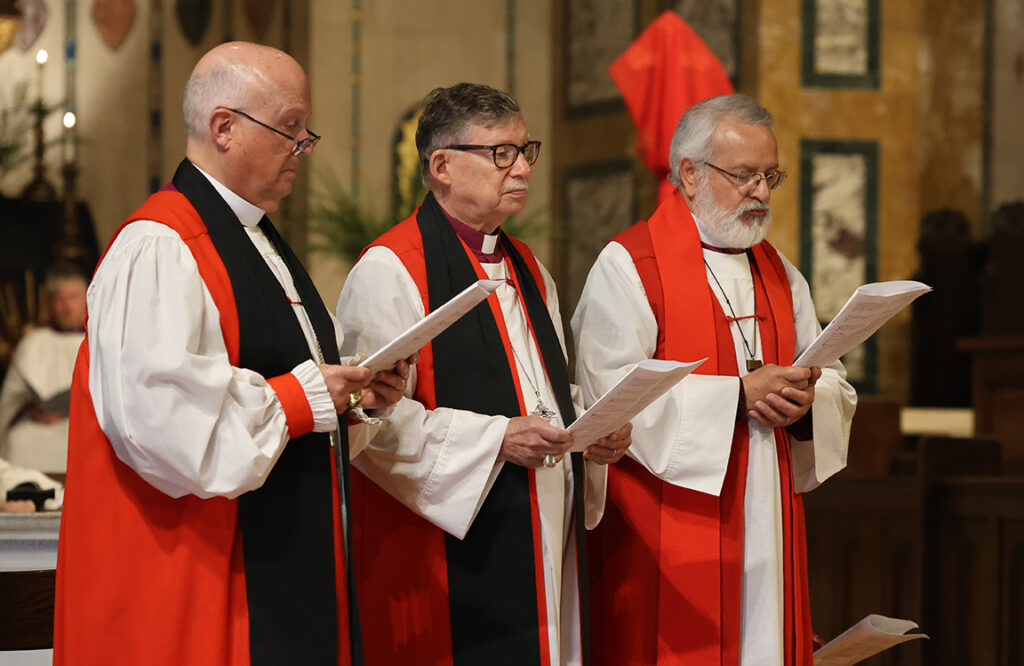
Bishop Gomes, at right, and fellow bishops assistant Frank Brookhart and Ed Little, joins in the Renewal of Vows service during Holy Week at St. John’s Cathedral. Photo: Janet Kawamoto
PGHM, Ruvalcaba said, plans and carries out programs for existing Latino Episcopalians as well as outreach projects for the Latino/Hispanic community. Those projects, he said, include Instituto de Liderazgo (School for Leadership); El Gran Convivio (The Great Banquet), a Cursillo program; Ahora que Nuestro Mundo ha Cambiado (Now that Our World Has Changed); and a Spanish-language diocesan Facebook page.
The clergy cohort lifts up those serving the Spanish-speaking congregations with both spiritual and practical help, Gallardo, the outgoing convener, said. Some of those clergy lead “some of the less-resourced congregations in our diocese,” he said. “It broke my heart to learn that some of them did not even have a new paschal candle for Easter (and got a used one given to them), and that some of them were not paid enough to take care of their families and had to secure another job or sell tacos on Sundays.”
He was inspired by their perseverance against such challenges. “I have learned to admire them for being truly servants of God and God’s people, so my job focused on learning about what they needed to do their ministry and providing the safe space for sharing their lessons learned, their best practices, and for growing spiritually. In the past four years we have continued being there for one another, meeting regularly, learning together, sharing our lives in ministry, and growing spiritually.”
Gomes sees the Latino/Hispanic community as both a mission field for The Episcopal Church and a source of new vitality and growth.
“I believe that our church with its radical welcome to all people, striving always to be a community that follows the way of love, has a lot to offer to the Latino/Hispanic community, which day by day increases in numbers,” he said. “We have also learned a lot about the spirituality of these people, and their devotions to saints [such as] Our Lady of Guadalupe, and Monsignor Oscar Romero. We will certainly be able to learn a lot more with them. And at the same time, it is a great opportunity for mission, strengthening and growth for the church. We must be prepared for that. May the Holy Spirit inspire us and give us wisdom to do it.”
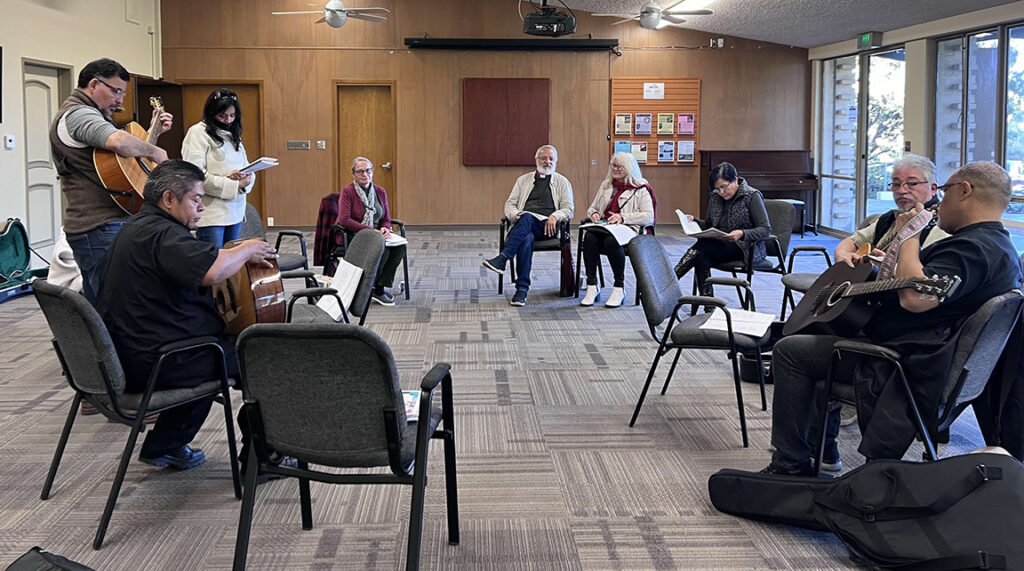
Bishop Naudel Alves Gomes (center) and members of the Latino/Hispanic clergy group, share music at one of their meetings. Photo: Courtesy of Antonio Gallardo
